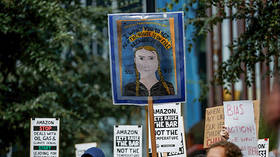‘Never been so ashamed’: Stockholm’s begging ban narrowly passed in ELITE district has Swedes arguing over welcoming v. security
Lidingö, a tony area whose residents include ABBA and other celebrities, has become the first in Stockholm to ban begging. Seemingly flying in the face of the Swedish identity, the move, passed by one vote, has divided the city.
With its elite residents including ABBA’s Bjorn Ulvaeus, Lidingö is only the seventh municipality in all of Sweden to ban begging, and the idea still makes many Swedes uncomfortable.
In a country whose very identity is tied up with its robust universal welfare state and which for years had what was considered Europe’s most welcoming attitude to outsiders, the decision came as a bit of shock. Some outraged locals have called it a violation of human rights. Others, however, said it’s necessary to keep the well-heeled residents safe.
“The begging is a big problem and makes many Lidingö people feel insecure,” Daniel Källenfors, chairman of the municipal council, told Dagens Nyheter on Monday, after the measure was passed.
Opponents of the ban say it merely pushes the problem into other municipalities and scoff at the idea that moneyed locals feel threatened by beggars. “I have not so far found any Lidingö residents who say they are insecure,” Patrik Buddgård of the Center Party told DN. His party joined the Liberals to oppose the ban, which squeaked by with a vote of 26 for to 25 against.
READ MORE: Current trends in self-reproach & guilt serve interests of elites – Slavoj Zizek
“I’m afraid of this development,” Anna Larsdotter Persson, who watched the vote from the audience, told Mitti.se, adding that she “does not buy” the idea that the ban will improve the lives of beggars and believes it is a “populist policy” masquerading as something else.
“I have never been so ashamed of Lidingö as I am now,” Anita Dorazio, a representative for the Stockholm Asylum Committee and refugee advocate, told the outlet.
Their shame – and the controversy itself – cuts to the heart of Swedish identity and the feasibility of a universal welfare state in the midst of a migration crisis. The oft-praised “Nordic model,” a hybrid of market economy and socialist services, boasts a strong social safety net that guarantees the rights of even the most vulnerable residents.
But the beggars, in many cases that attracted publicity, are not locals. Six Bulgarians were arrested in December for trafficking nine of their countrymen to southern Sweden and forcing them to beg. The victims, including a pregnant woman who miscarried after she was assaulted by the traffickers, were fined, beaten, or starved by their “employers” if they did not bring in enough cash, according to Växjö District Court’s ruling.
READ MORE: Sweden turns Pippi Longstocking into homeless Roma migrant living in Stockholm ghetto
Nor are beggars the only ones feeling the chill as the famously welcoming Swedish attitude begins to curdle after years of abuse. Faced with the reality that over 418,431 asylum-seekers – and a total of 920,206 immigrants – have made their way to Sweden since the Syrian war kicked the migrant crisis into high gear, Sweden, with a population of less than 10 million, has belatedly realized that being a migration capital of Europe isn’t all it’s cracked up to be. Bengtsfors, a municipality in southern Sweden, was forced to beg the government for economic help earlier this year after taking in more migrants than it could afford.
Nearby Filipstad is facing a similar crisis as many native Swedes move out, distressed by the seemingly endless flood of unemployable African migrants, leaving the community with no tax base and unable to support the new arrivals.
Swedish authorities have stopped collecting statistics comparing the ethnicity of criminals. The last published statistics, issued in 2005, found foreign-born individuals four times more likely to be homicide suspects and 4.5 times more likely to be rape suspects. Hence, it is unclear what percentage of beggars in Sweden come from outside the country.
But the first Swedish begging ban, which finally went into effect at the beginning of the year in Vellinge, a suburb of Malmö, faced 18 months of legal challenges and condemnations from NGOs calling it “racist” and “xenophobic” – suggesting that most of the beggars there are foreign-born. Under that law, beggars are given a verbal warning, then physically removed, and only after repeat offenses apprehended by police. The Moderate Party has campaigned to ban begging nationwide, and a survey by state broadcaster SVT found at least 40 other municipalities are keen to adopt their own bans. But these measures seem less a solution than a tiny band-aid on the gaping flesh wound caused by ill-thought-out immigration policy – and also one that makes Swedes look somewhat hypocritical, to boot.
If you like this story, share it with a friend!














